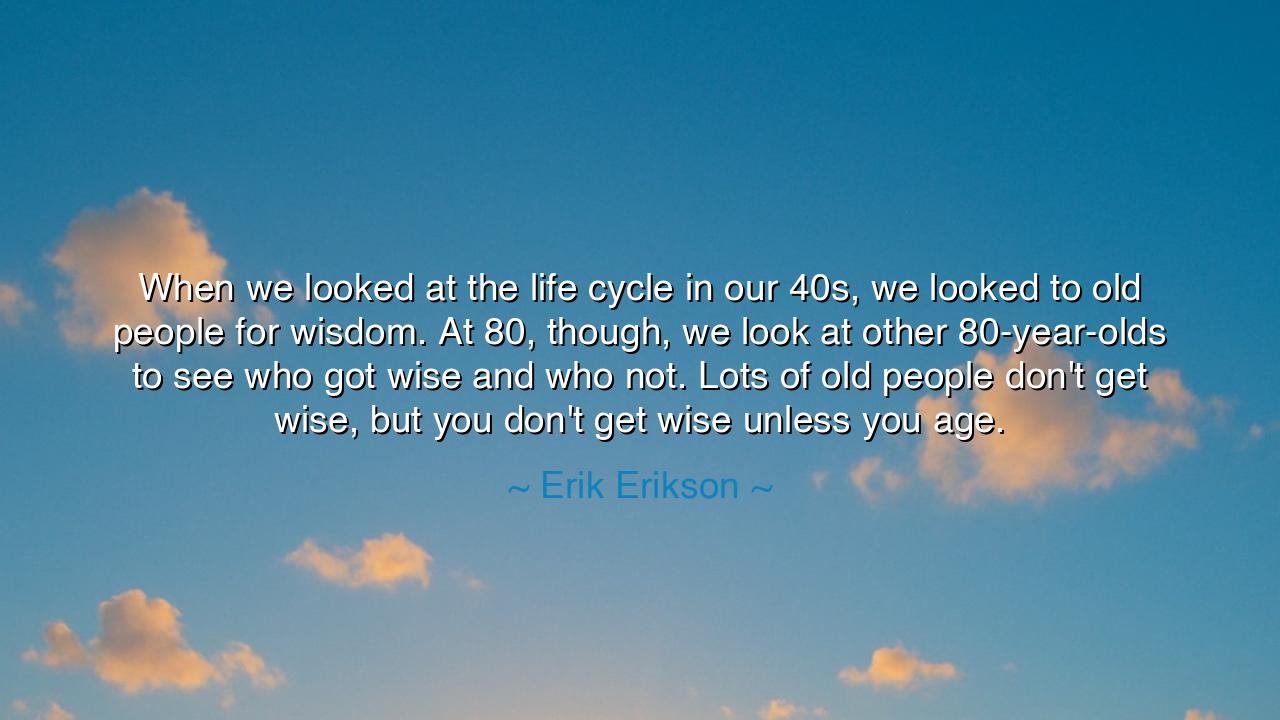
When we looked at the life cycle in our 40s, we looked to old
When we looked at the life cycle in our 40s, we looked to old people for wisdom. At 80, though, we look at other 80-year-olds to see who got wise and who not. Lots of old people don't get wise, but you don't get wise unless you age.






Harken, O children of the future, to the words of Erik Erikson, a wise philosopher of the human soul, who speaks of the journey that each of us must take from youth to age. "When we looked at the life cycle in our 40s, we looked to old people for wisdom. At 80, though, we look at other 80-year-olds to see who got wise and who not. Lots of old people don't get wise, but you don't get wise unless you age." These words, simple yet profound, illuminate the delicate nature of wisdom and the life cycle—how age, that inevitable march of time, brings with it not only the possibility of growth but also the challenge of how we embrace the lessons life offers.
In the early stages of life, when we are still in the springtime of our existence, we look to the elders with reverence and respect. The wise ones are the keepers of stories, the holders of knowledge passed down through generations. When we are in our 40s, we begin to understand that the wisdom of age is not something to be taken for granted. It is something earned through the trials of life, through the victories and defeats that shape a soul over time. Youth looks to the elder as a guide, for the elder has traveled the road we are only beginning to tread. The wisdom we seek seems to be a distant treasure, hidden in the years of experience, waiting to be uncovered by the hands of time.
But, as Erikson so rightly observes, when we reach the age of 80, the dynamic changes. The passage of time has brought with it a different lens through which to view life. Now, as the elder ourselves, we begin to look at others who share our years, asking the question: "Who has become wise in these years?" It is no longer a simple matter of looking to others for guidance, for we, too, have walked the path of age. Now, we see that wisdom is not guaranteed by the mere passage of time; it is a choice, an inner transformation that requires the soul to learn, to reflect, and to grow. The years may pass, but wisdom is not automatically bestowed; it is the result of a life lived with purpose, reflection, and a willingness to face one’s own flaws and weaknesses.
Consider, O wise ones, the example of Socrates, the ancient philosopher, who, even in his later years, embodied the virtue of wisdom. Socrates, though not physically youthful, was sharp of mind and clear in purpose. His wisdom was not simply a product of his age but of his lifelong commitment to self-examination. He spent his days questioning the nature of truth, virtue, and knowledge—and in doing so, he grew wiser with each passing day. His famous declaration, "The unexamined life is not worth living," speaks to this very truth: that age alone does not bring wisdom; it is the willingness to examine and learn from life that makes one wise. Socrates teaches us that wisdom is a conscious effort, not a passive gift granted by time.
Yet, as Erikson also warns us, not all old people become wise. The years may pass, but without the willingness to reflect, without the courage to confront one’s own limitations and mistakes, the soul remains stagnant. There are those who, even in their advanced years, cling to the habits and beliefs of their youth, unwilling or unable to adapt. They may be physically old, but their minds and hearts remain bound by the same patterns they carried in their younger years. These individuals, though rich in years, are poor in wisdom, for they have failed to grow with the passing of time. Wisdom, then, is not a passive inheritance; it is an active and intentional process that demands growth, self-discipline, and a willingness to learn from both the light and the dark moments of life.
The lesson that Erikson imparts is one of awareness—that true wisdom does not come with mere age, but with the mindful reflection of a life lived. As you age, O children, you must not simply watch the years pass, but you must engage in the process of becoming. Do not be satisfied with the mere accumulation of time; seek to accumulate knowledge, experience, and understanding. You must ask yourselves not just how old you are, but how wise you are becoming. As the years unfold, reflect on the mistakes and triumphs of your past, learn from them, and strive to improve the inner self. Do not allow age to be a time of regret or stagnation, but a time of growth and refinement.
Therefore, let this wisdom guide you, O children of the future: as you age, seek not to simply grow older, but to grow wiser. The world needs the wisdom that comes from lived experience—wisdom that is born not of time alone, but of reflection, self-awareness, and a continual striving for personal growth. When you reach the age of 80, look to those around you and ask: who has truly become wise, and what path did they walk to earn that wisdom? In doing so, you will find that the pursuit of wisdom is not just for the young, but for all ages—each of us, at every stage of life, must commit to learning, growing, and becoming more than we were before. Only then will the passage of time bring the rich reward of wisdom.






AAdministratorAdministrator
Welcome, honored guests. Please leave a comment, we will respond soon